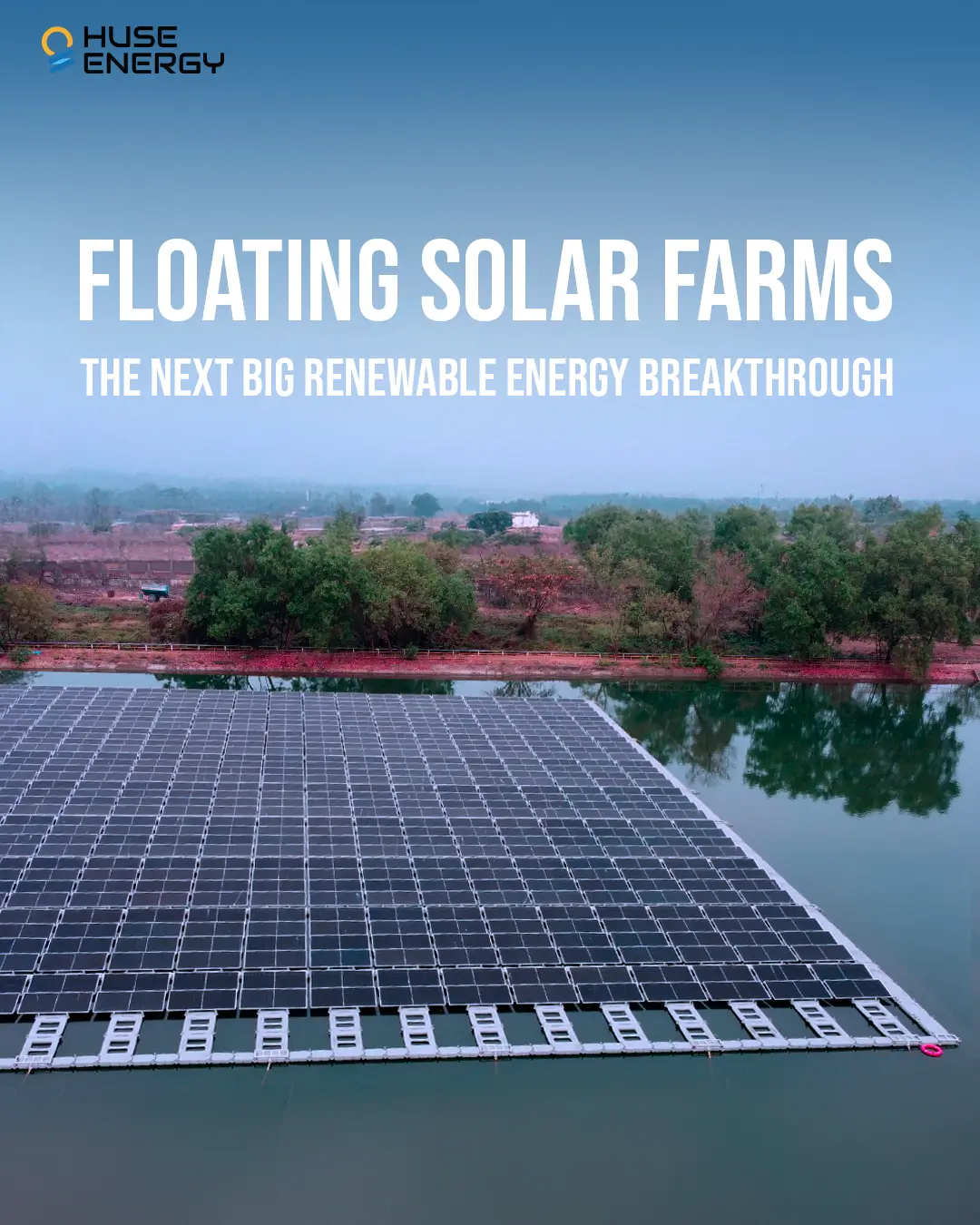
29 Oct Floating Solar Farms: The Next Big Renewable Energy Breakthrough by leading Floating Solar PV Company
Floating solar farms are transforming the renewable energy industry by harnessing solar power on water. These innovative techniques provide a long-term solution to the rising demand for energy without occupying valuable land. As the world looks for better energy alternatives, floating solar farms are becoming a promising technology. Many businesses, including Floating Solar PV Company, are leading the way in this transformation.
How Do Floating Solar Farms Work? A Guide from Leading Floating Solar PV Company
Floating solar farms function similarly to typical solar installations; however, they are located on bodies of water. Floating structures, such as pontoons or high-density polyethylene (HDPE) floats, hold solar panels securely in place. These devices use photovoltaic technology to convert sunlight into electricity. Several floating solar companies in India are set to use this technology and connect it to the national grid to make more renewable energy available.
Benefits of Floating Solar Farms: Why Floating Solar PV Company Solutions Are Growing
Offering many benefits, floating solar farms are a desirable choice for generating sustainable energy. They offer a flexible option that can be used in a range of water bodies, such as lakes, reservoirs, and irrigation canals.
· Efficient Land Use
Floating solar farms save land for agriculture and urban development by using water bodies. This is especially helpful in densely populated regions where land is scarce. Furthermore, these installations can be integrated into the current infrastructure, which lowers the need for new land acquisition.
· Enhanced Solar Efficiency
The solar cells function better because the water beneath the panels cools them to the optimal temperature. These may generate more energy than land-based ones because of natural cooling. Water surfaces reflect sunlight, which may hit panels. Huse Energy uses this advantage to increase floating solar installation efficiency and output.
· Water Conservation
Providing shade, floating solar panels keep water from evaporating from lakes and reservoirs. In dry places where saving water is important, this is very important. In addition, the shade effect can help reduce the growth of harmful algae, improving water quality.
· Reduced Installation Costs
Installing solar panels on water bodies may be more affordable than installing them on land. Proximity to existing electrical infrastructure, such as hydroelectric plants, may reduce transmission costs. Furthermore, the modular structure of floating systems facilitates scalable development.
· Minimal Environmental Impact
Compared to other energy sources, floating solar farms leave a lower environmental footprint. Additionally, they generate clean energy without releasing greenhouse gases. Furthermore, these systems can coexist with aquatic ecosystems with minimal disruption.
Challenges Floating Solar Farms Must Deal With for Their Usefulness – Floating Solar PV Company Insights
Despite their benefits, floating solar farms must overcome various obstacles for widespread adoption. These problems must be carefully controlled by a Floating Solar PV Company to guarantee that the installations remain efficient, reliable, and economically viable in the long run.
· Material Durability
The aquatic environment can speed up the breakdown of materials used in floating solar panels. Biofouling and corrosion are significant issues that can reduce the longevity and performance of the systems. Developing robust, corrosion-resistant materials is critical to the long-term viability of these systems.
· Regulatory and Permitting Issues
Navigating the regulatory framework for floating solar farms may be challenging. Regional permitting processes can include environmental impact assessments and consultations with stakeholders. Streamlining these procedures may help with the deployment of floating solar installations.
· Grid Integration Challenges
The technical challenges occur while trying to incorporate floating solar farms into the power grids. The more intermittent the sun’s energy is, the more grid stability, energy storage, and transmission infrastructure needs to be improved. Utilities and developers will have to come up with solutions for these challenges in collaboration.
· Complex Installation and Maintenance
There is a need for specialized skills and equipment provided by the Floating Solar PV Company to install and maintain floating solar panels. Accessing panels on waterbodies, particularly far from the reach of urban areas, could be challenging. Maintenance is needed to have optimal systems and avoid failures.
· Public Perception and Acceptance
Public perception of floating solar farms has the capacity to inform their adoption. Concerns over water quality, aesthetics, and environmental deterioration have to be assuaged by openness and public involvement. Education programs can provide public backing.
Future of Floating Solar PV Company
New innovations in solar technology portend a bright future for floating solar farms. Better materials and panel designs will make them stronger, more efficient, and more powerful. Market penetration, especially in areas where there are plenty of water bodies, will accelerate uptake. Integration with other renewable energy sources, such as hydro and wind, helps provide a steady power output. Policy from the government and subsidies from investors will encourage the widespread uptake of these clean energy solutions.
Conclusion
Huse Energy, a renowned Floating Solar PV Company is leading the way in sustainable energy by designing revolutionary floating solar systems. These projects aim to revolutionize the world’s energy production sustainably and efficiently by overcoming obstacles and adopting new technology. Get in touch with us to know more about floating solar plant and renewable energy solution.


